
Contents





A Magician Who Works Miracles
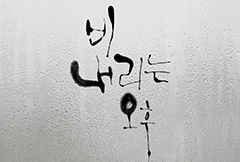
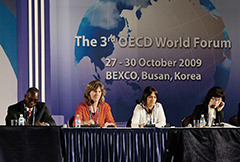




Journey to Realizing My Dream
On Stage, I Keep on Hoping
“Why did you come to Korea?” Living in Korea, this might be the question I’ve been asked a thousand times with my obviously different appearance. If I am in a good mood I’d explain my whole story, which is quite long, but if I am not, I’d just cut it short—“Because I like it.” While either way it’s true, I will take my time to share how I fell in love with Korea and my journey in Korea as an actress.
Written & photographed by Anna (Yoon) Rihlmann, actress
 A stroll into the forest in Incheon.
A stroll into the forest in Incheon.Homesick for Korea
Ever since I was little, I loved movies. When I was 14 years old, I watched the movie 3-Iron by a Korean director Kim Kiduk. I was impressed by how intense the movie was even when there was almost no dialogue among the actors. That intensity made me want to explore more about Korean movies and Korea itself. At my friend’s house where Arirang TV was available, my friend and I spent a lot of time watching Korean music videos and short films. When I turned 15 years old, I got the first Korean study book as a birthday present, which turned out to change my life, and I started learning Korean by myself. My curiosity and interest in Korea grew only bigger, and I finally had a chance to see the country I’d felt so connected to when my pastor introduced me to the church program. Like that, I visited Korea for the first time in 2009.
Not all people were actors and actresses like the movie nor was Korean life. However, I had an authentic experience instead, and I loved all the things and people I encountered in Korea. Two weeks went by too fast. I found myself being homesick for Korea when I was back in Germany. I had to go back to Korea.
I didn’t mind working several parttime jobs to visit Korea, and when I finally went to college I chose my major as Media Studies and Korean Studies, which brought me back to Korea once again. It was such a precious opportunity for me, so this time I tried to make the best use of my time by engaging in many internships at national organizations. After finishing college with my thesis paper about the legendary director Im Kwontaek, I came back to Korea to pursue my career.
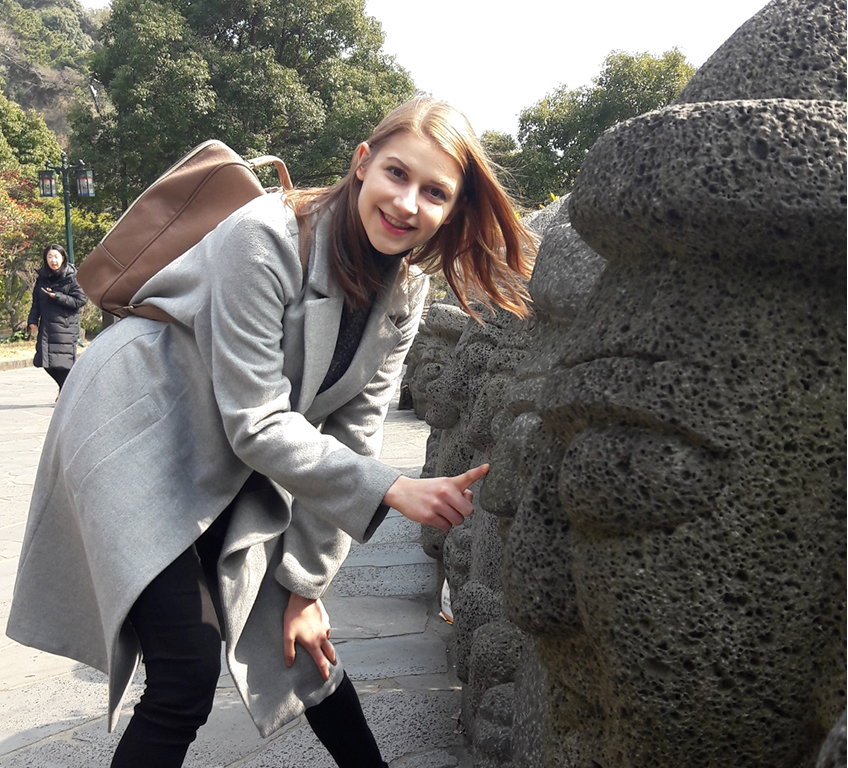 She is patting the nose of the large rock statue Dol-hareubang in Jeju, which is believed to bring protection and fertility from God.
She is patting the nose of the large rock statue Dol-hareubang in Jeju, which is believed to bring protection and fertility from God.Korea, Where My Dreams Come True
It is often said “dreams will come true.” In my case, Korea made it happen. In 2013, I watched the theater play “The Chronicle of Alibis” by the Korean director Kim Jae-yep at the National Theater of Korea. Back then, I loved it so much and I thought to myself I’d love to be part of something amazing like this, as I was dreaming of becoming an actress. Now, five years later, I am a member of the theater group which put on the play that inspired me. I’ve already performed four plays with the director Kim Jae-yeop, and acted in several plays with most of the actors who were in that play. Seeing myself perform on the stage of the National Theater of Korea, I can say that my dream has actually come true.
“Dreamplay”
The immediacy with the audience is the reason why I love theater, not only in a physical sense but also intellectually. My theater company “Dreamplay” mostly deals with the theme of current society and the politics of Korea. The director creates plots where the actors can actually talk to the audience, mainly in the documentary genre.
Meanwhile, what we try to deliver is not always comfortable. In 2016, my theater company was put on the culturalblacklist, by former President Park Geunhye. It was because one of our plays was about the Sewol Ferry disaster that took away hundreds of innocent lives. The government was directly criticized for not taking immediate actions that could’ve saved many lives. Luckily the political situation in Korea has changed and the censorship of art ceased.
In 2017, we performed two plays in direct relation to Germany. The first one, called “Die Gedanken sind frei” (Our thoughts are free), was adapted from a famous German song on the wish for independence. It was about the situation that Korean and German theater had to face, criticizing the former Korean government. The other play “Why didn’t the nurses go back?” tells the story of the Korean workers who were sent to Germany in the 1970s. The performance, based on true characters, shows the life of four nurses who went to Germany and how they fought for their rights as a worker, woman and foreigner.
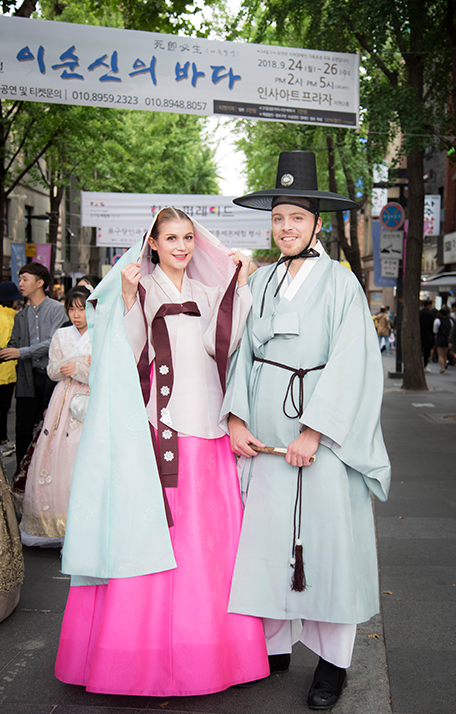 Anna (Yoon) Rihlmann became a Hanbok model of Insadong in Seoul with her German friend Lucas. © Kwang-Eun Son
Anna (Yoon) Rihlmann became a Hanbok model of Insadong in Seoul with her German friend Lucas. © Kwang-Eun Son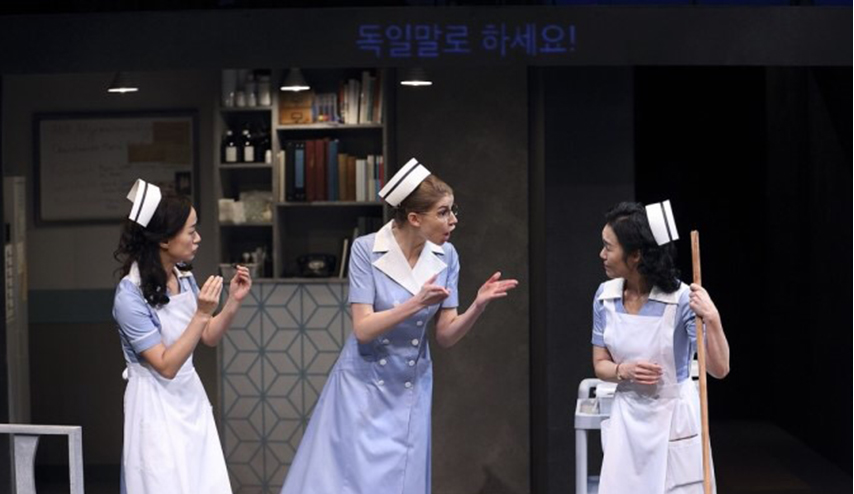 Anna (Yoon) Rihlmann played a nurse in “Why didn’t the nurses go back?” in 2017. The play portrays the story of Korean nurses who went to Germany in the 1970s.
Anna (Yoon) Rihlmann played a nurse in “Why didn’t the nurses go back?” in 2017. The play portrays the story of Korean nurses who went to Germany in the 1970s.My First Movie
The most important thing for an actress is to meet good scenario, roles and people. In 2016, I had an experience, for which I will always be grateful, to meet all these three. CGNTV Korea, the Christian Global Network Television of Korea, produced a documentary movie about the German-American missionary Johanna Elisabeth Shepping who came to Korea as a nurse in the beginning of 1900s to proselytize, educate and help Korean people with medical service. I played the main character Shepping, portraying the life of this brave woman who embraced Korean culture and the people in her heart.
What made this experience extraordinary for me was, surprisingly, my Mom. When the documentary was filmed, my Mom was visiting me in Korea. One day before the film shooting, the actress who was supposed to play a close friend of Shepping suddenly withdrew. We were looking for a replacement and my Mom was there at the right time as a 50-year-old Western woman. My mother, who had never stood in front of a camera before, agreed to help. We flew to Jeju Island where the documentary was filmed. After one night of preparing for everything from scenario practice to changing costumes, we started filming the documentary together. On her first trip to Korea, instead of sightseeing, she had to wake up early in the morning, get a makeup and work with me. It was an emotional experience to be in the sad scene with my mother when Shepping and her friend say good bye to each other. My parents didn’t even have a chance to take a glance at Hallasan Mountain or taste local food, but after all, how many moms could be in a real movie with her daughter? It was such an unforgettable experience for both of us.
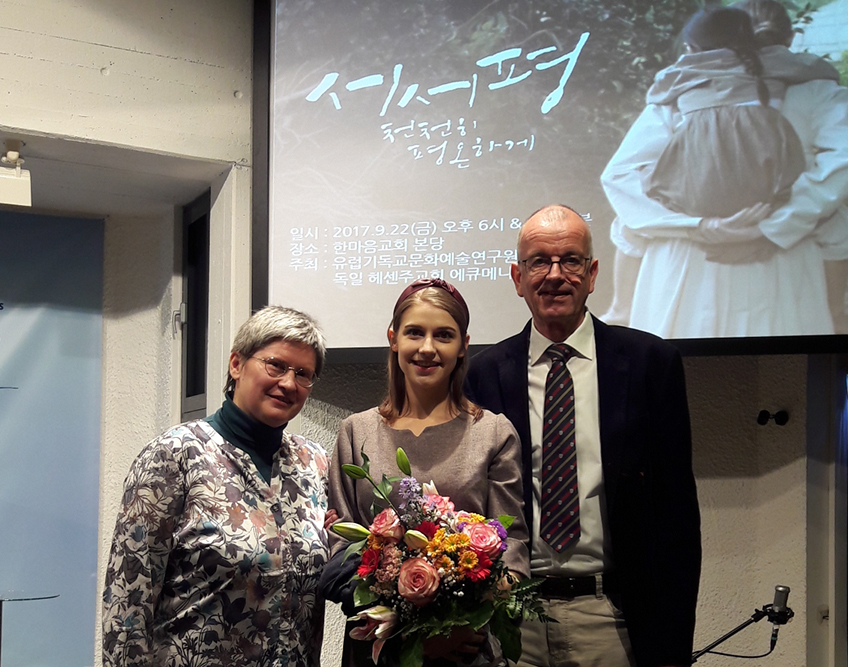 Anna (Yoon) Rihlmann met her parents at the Korean church in Frankfurt, Germany where they had a screening of her movie “Suh-Suh Pyoung, Slowly and Peacefully.”
Anna (Yoon) Rihlmann met her parents at the Korean church in Frankfurt, Germany where they had a screening of her movie “Suh-Suh Pyoung, Slowly and Peacefully.”The movie was a great success. The team and I went to many screenings all over the country. The movie was also released in the United States and Germany. This low budget movie supported by many people motivated me a lot and showed me that a good piece of work can actually succeed. As I get my energy from people who support my work and me, I hope with all my heart that people get their energy from what I do as well.
Coming to Korea challenged me in several ways. The roles I can play, as a non-Korean woman, are very limited. However, I don’t let it discourage me and instead use it as an inspiration. I’m currently preparing to shoot my first short film as a director and actress. In that sense, what challenged me the most has actually turned into something better: creating my own movies. Holding on to this attitude, it is my dream to become an international artist. I don’t want to limit what I can do because of my nationality or my appearance. I want people to see me as who I am, rather than where I am from. I want people to see me as an artist based on what I do. I will keep on hoping and will never give up until this dream comes true once again, just like my dream as an actress has come true on the Korean stage.
Korea & I features contributions from non-Korean, reflecting the opinions of the writers as faithfully as possible. Thus the opinions expressed therein may differ from the opinions of the editors of KOREA magazine.
Other Articles





A Magician Who Works Miracles





Application of subscription
Sign upReaders’ Comments
GoThe event winners
Go


 November 2018
November 2018


